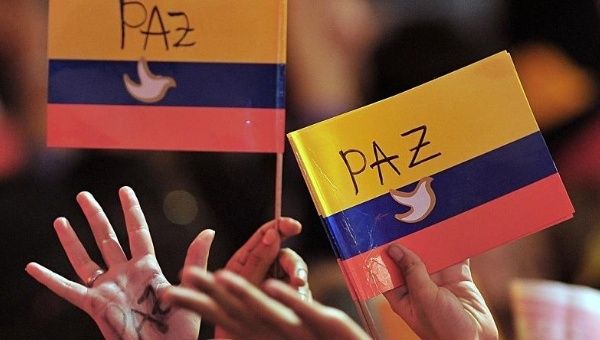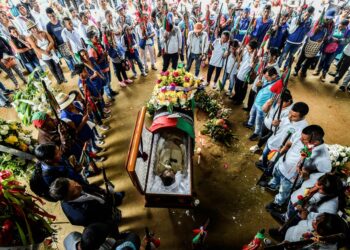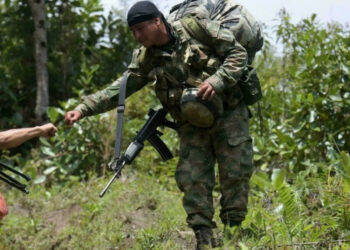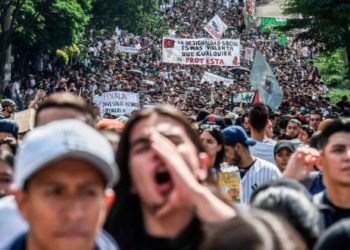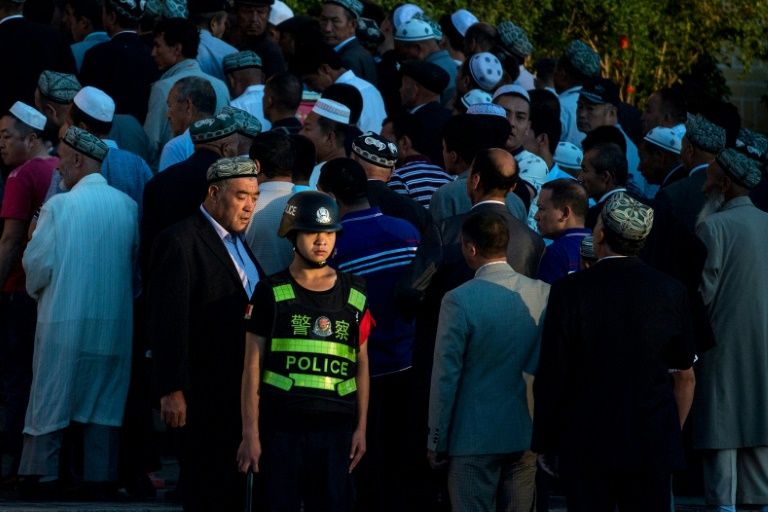Since independence in 1810, Colombia has lived through successive waves of violence, with each wave recycling and deepening the divisions of the previous one. It seems increasingly likely that the 2016 Havana Peace Agreement is leading to history repeating itself.
The peace deal between the government and the FARC-EP guerrilla sought to end five decades of armed conflict. It won international approval due to its focus not only on disarming the FARC, but also its commitments to structural transformations aimed at preventing new spirals of violence.
These commitments, including rural reform, strengthening of democracy, redressing the rights of over eight million victims, and comprehensive solutions to the drug-trafficking problem, made the deal the “most complete” of all peace accords since 1989, according to the institute that is in charge of monitoring implementation.
Duque and Peace Agreement
President Ivan Duque, elected in June and in office since August, staunchly campaigned against the agreement in the run-up to his election and promised to make substantial changes, prompting concern about the fate of the peace process.
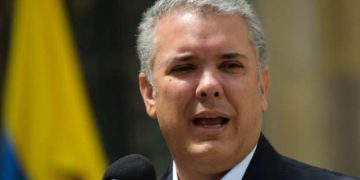
The first five months of his administration have done little to alleviate that concern. Although Duque said in a visit to Paris that he would fulfill the state’s commitment to implement the agreement – an obligation enshrined in law for the next three governments – he completely avoids talking about peace at home.
His New Year’s message did not even mention the word peace, and neither did he attend the formal two-year commemoration of the signing of the agreement. This ambivalence is the defining characteristic of his government so far.
Recycling Violence
Meanwhile, Colombia started a new recycling of violence. Over 220 social leaders were killed in 2018, and, although in 2017 some 13,000 members of the FARC laid down their weapons and transitioned to their new political party, nearly 100 of them have been killed. In December, a member of the state agency in charge of supporting the reincorporation of the FARC into civil society was also assassinated.
These statistics worryingly recall the failure of a previous peace process: between 1984 and 1986, over 200 FARC members who tried to leave the armed struggle and do politics were assassinated.
As the Colombian state failed to secure the areas previously controlled by the FARC, there has been a reconfiguration of armed groups, who are competing to control territory and legal and illegal economies, including the drug trade. Duque has made no progress with the peace negotiations with rebel group National Liberation Army (ELN), and this guerrilla now looks set to get stronger.
Post-Truth Politics and Polarization
A key underlying factor of post-accord violence is the connection between political polarization and security. Though former President Juan Manuel Santos won the Nobel Peace Prize for the Havana Agreement, he failed to achieve sufficient support from the Colombian society to secure the peace.
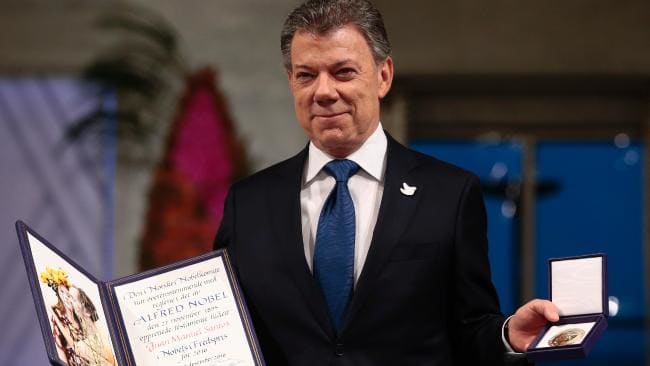
He ran a referendum on the deal in 2016, and Duque’s right-wing Democratic Centre party, which had vehemently opposed the peace process since the party’s founding in 2014, employed a misinformation campaign, that a national tribunal later classified as “generalized deceit.” The referendum lost by only 50,000 votes. Social divisions – natural after decades of war – became more polarized. The Democratic Centre party built on their success and continued scaremongering about the agreement throughout 2017 and 2018. This partly led to Duque’s success.
The global use of “post-truth” politics to polarize public opinion is associated with a rise in violence. Duque’s New Year’s speech called for an end to polarization, yet he has failed to tackle the polarization about the peace process which his party has promoted. This is not to say simplistically that the government is behind the killings of leaders and ex-combatants. However, just as in the U.K. that witnessed a spike in racist attacks after the Brexit vote, there is a connection in Colombia between the new cycle of violence and the rhetoric encouraged by the Democratic Centre party. People feel their hatred is legitimated.
This is a vicious cycle: the legitimation of violence against “others” demonized by public opinion fuels government legislation that enables new cycles of violence, and vice versa.
Loosening Gun Law
A recent example of this is a request from the Democratic Centre and Conservative party congressmen to Duque to relax gun laws and allow civilians to own guns for personal defense. There was an outcry from pro-peace sectors of civil society. They saw echoes of 1994 when a law was passed to arm civilians and create “security cooperatives,” or Convivir, to support the army’s counterinsurgency efforts – a key factor in the spread of paramilitary death squads. There are also obvious international echoes, and top Colombian jurist Rodrigo Uprimny tweeted a link to a 2013 study showing that higher gun ownership makes countries more violent.
Una buena lectura de Navidad para el presidente Duque: esta nota del Guardian, basada en un estudio del prestigioso American Journal of Medicine, que demuestra que mayor tenencia de armas en la población hace a los paises menos seguros y no más seguros.
— Rodrigo Uprimny (@RodrigoUprimny) December 25, 2018
Duque signed a renewal of an existing decree which prohibits private individuals’ ownership of weapons, except with explicit authorizations by the military in specific cases, but added a new paragraph specifying that the Minister of Defense would define the criteria of these authorizations. Lamentably, Minister of Defense Guillermo Botero has contributed greatly to polarization, accusing social protest of being financed and promoted by illegal armed groups, and saying social protests should be regulated by law.
The paragraph added to the gun law, on its own, is not a major new development. However, it forms part of crystallization of conditions for a new cycle of violence, in which government legislation and public legitimation of violence reinforce each other, producing radicalization of the right and politics of hatred.
Other recent developments contributing to these conditions include devastating budget cuts to the transitional justice mechanisms created by the peace agreement; Democratic Centre congressmen proposing changes to the laws governing the transitional justice tribunal to favor military impunity; and the appointment of government officials who have staunchly opposed the deal in positions that are key for the correct implementation of the agreement, such as Claudia Ortiz, controversial also because her CV does not meet the academic and professional requirements of the position.
In the same vein, Duque has nominated candidates that have denied the existence of an armed conflict completely as director of the National Centre for Historical Memory. The latest, Vicente Torrijos, turned down the position after public repudiation and 6,000 signatures against his appointment because he had lied about having a Ph.D. and was too close to the military.
History Narration as Battlefield
In any post-conflict, as weapons are silenced, the narration of history becomes the new battlefield.
The Havana Agreement created an innovative transitional justice system, praised by experts worldwide, which enabled the participation of all sides. This system, comprising a truth commission, special tribunal, and unit to search for the disappeared, needs public legitimacy if it is to fulfill its objective of helping the country end its cycles of violence and start a new virtuous cycle of peace-building.
Duque’s lack of support to this system, while not attacking it directly, is characteristic of his ambivalence on the peace process. This ambivalence effectively permits the continued stigmatization of members of the FARC’s new political party and of social leaders who have participated in the implementation of the Peace Accord. This exposes them to violent reprisals, thus undermining the possibility of reconciliation in Colombia.
Disclaimer: The views and opinions expressed here are those of the author and do not necessarily reflect the editorial position of The Globe Post.

